

Literary Criticism
- Introduction
- Literary Theories
- Steps to Literary Criticism
- Find Resources
- Cite Sources
- thesis examples
SAMPLE THESIS STATEMENTS
These sample thesis statements are provided as guides, not as required forms or prescriptions.
______________________________________________________________________________________________________________
The thesis may focus on an analysis of one of the elements of fiction, drama, poetry or nonfiction as expressed in the work: character, plot, structure, idea, theme, symbol, style, imagery, tone, etc.
In “A Worn Path,” Eudora Welty creates a fictional character in Phoenix Jackson whose determination, faith, and cunning illustrate the indomitable human spirit.
Note that the work, author, and character to be analyzed are identified in this thesis statement. The thesis relies on a strong verb (creates). It also identifies the element of fiction that the writer will explore (character) and the characteristics the writer will analyze and discuss (determination, faith, cunning).
Further Examples:
The character of the Nurse in Romeo and Juliet serves as a foil to young Juliet, delights us with her warmth and earthy wit, and helps realize the tragic catastrophe.
The works of ecstatic love poets Rumi, Hafiz, and Kabir use symbols such as a lover’s longing and the Tavern of Ruin to illustrate the human soul’s desire to connect with God.
The thesis may focus on illustrating how a work reflects the particular genre’s forms, the characteristics of a philosophy of literature, or the ideas of a particular school of thought.
“The Third and Final Continent” exhibits characteristics recurrent in writings by immigrants: tradition, adaptation, and identity.
Note how the thesis statement classifies the form of the work (writings by immigrants) and identifies the characteristics of that form of writing (tradition, adaptation, and identity) that the essay will discuss.
Further examples:
Samuel Beckett’s Endgame reflects characteristics of Theatre of the Absurd in its minimalist stage setting, its seemingly meaningless dialogue, and its apocalyptic or nihilist vision.
A close look at many details in “The Story of an Hour” reveals how language, institutions, and expected demeanor suppress the natural desires and aspirations of women.
The thesis may draw parallels between some element in the work and real-life situations or subject matter: historical events, the author’s life, medical diagnoses, etc.
In Willa Cather’s short story, “Paul’s Case,” Paul exhibits suicidal behavior that a caring adult might have recognized and remedied had that adult had the scientific knowledge we have today.
This thesis suggests that the essay will identify characteristics of suicide that Paul exhibits in the story. The writer will have to research medical and psychology texts to determine the typical characteristics of suicidal behavior and to illustrate how Paul’s behavior mirrors those characteristics.
Through the experience of one man, the Narrative of the Life of Frederick Douglass, An American Slave, accurately depicts the historical record of slave life in its descriptions of the often brutal and quixotic relationship between master and slave and of the fragmentation of slave families.
In “I Stand Here Ironing,” one can draw parallels between the narrator’s situation and the author’s life experiences as a mother, writer, and feminist.
SAMPLE PATTERNS FOR THESES ON LITERARY WORKS
1. In (title of work), (author) (illustrates, shows) (aspect) (adjective).
Example: In “Barn Burning,” William Faulkner shows the characters Sardie and Abner Snopes struggling for their identity.
2. In (title of work), (author) uses (one aspect) to (define, strengthen, illustrate) the (element of work).
Example: In “Youth,” Joseph Conrad uses foreshadowing to strengthen the plot.
3. In (title of work), (author) uses (an important part of work) as a unifying device for (one element), (another element), and (another element). The number of elements can vary from one to four.
Example: In “Youth,” Joseph Conrad uses the sea as a unifying device for setting, structure and theme.
4. (Author) develops the character of (character’s name) in (literary work) through what he/she does, what he/she says, what other people say to or about him/her.
Example: Langston Hughes develops the character of Semple in “Ways and Means”…
5. In (title of work), (author) uses (literary device) to (accomplish, develop, illustrate, strengthen) (element of work).
Example: In “The Masque of the Red Death,” Poe uses the symbolism of the stranger, the clock, and the seventh room to develop the theme of death.
6. (Author) (shows, develops, illustrates) the theme of __________ in the (play, poem, story).
Example: Flannery O’Connor illustrates the theme of the effect of the selfishness of the grandmother upon the family in “A Good Man is Hard to Find.”
7. (Author) develops his character(s) in (title of work) through his/her use of language.
Example: John Updike develops his characters in “A & P” through his use of figurative language.
Perimeter College, Georgia State University, http://depts.gpc.edu/~gpcltc/handouts/communications/literarythesis.pdf
- << Previous: Cite Sources
- Next: Get Help >>
- Last Updated: Nov 1, 2024 9:59 AM
- URL: https://libguides.uta.edu/literarycriticism
University of Texas Arlington Libraries 702 Planetarium Place · Arlington, TX 76019 · 817-272-3000
- Internet Privacy
- Accessibility
- Problems with a guide? Contact Us.

Literary Analysis Essay
Literary analysis essay generator.

Literary analysis essays offer a deeper understanding and interpretation of literary works, allowing readers to delve into the intricacies of a story, poem, or novel. Whether you’re a student or a literature enthusiast, analyzing literature can be a rewarding experience. In this article, we will explore a collection of 30+ literary analysis essay examples available in Word, Google Docs, and PDF formats. We will also discuss essential elements such as analysis paper outlines , literary devices, short story analysis, literature reviews, theses, analogies, book reviews, context, and conclusions.
1. Literary Analysis Essay Outline Example
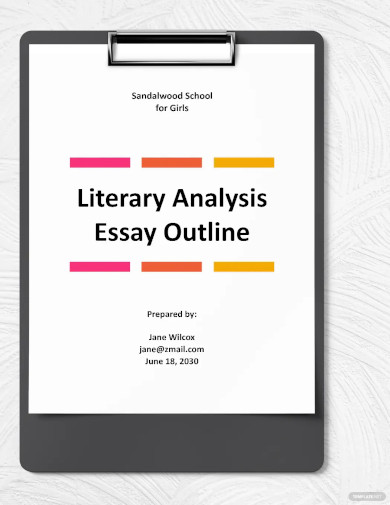
- Google Docs
2. Quotation Literary Analysis Essay Example
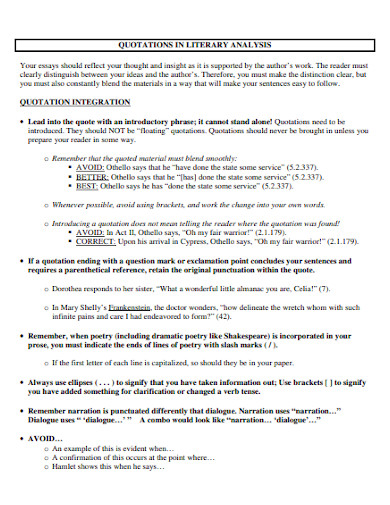
Size: 33 KB
3. Printable Literary Analysis Essay Example
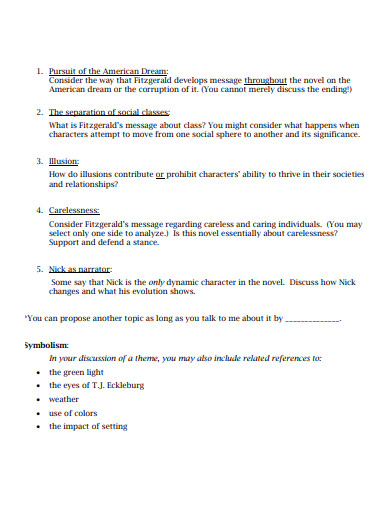
Size: 252 KB
4. Building a Literary Analysis Essay Example
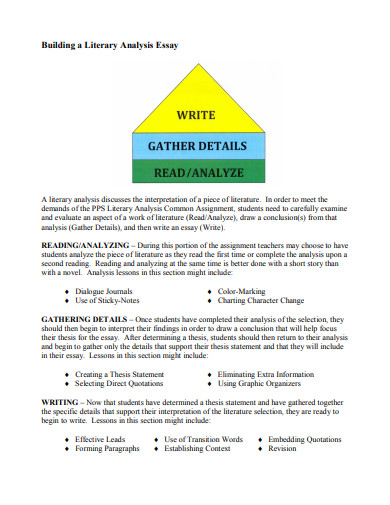
Size: 195 KB
5. Literary Analysis Essay Score Sheet Example
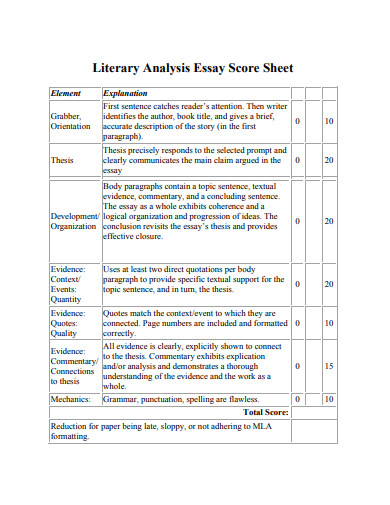
Size: 81 KB
6. Sample Literary Analysis Essay Example
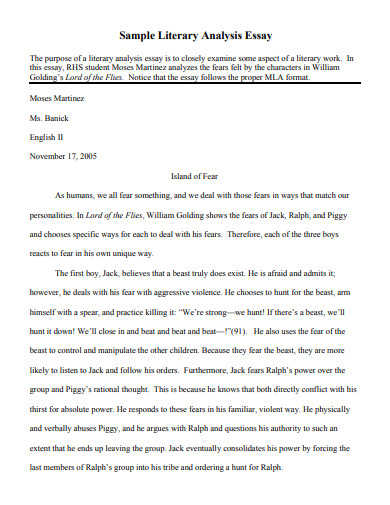
Size: 63 KB
7. Literary Analysis Essay Checklist Example
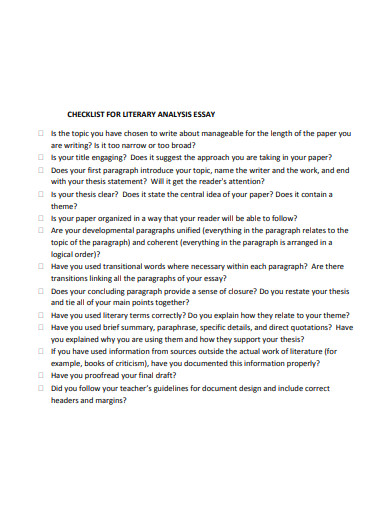
Size: 180 KB
8. Literary Analysis Essay Outline Example
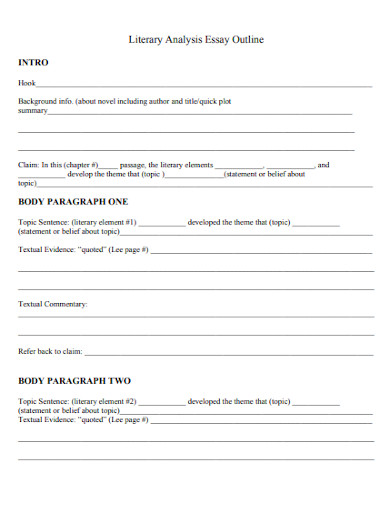
Size: 51 KB
9. Editable Literary Analysis Essay Example
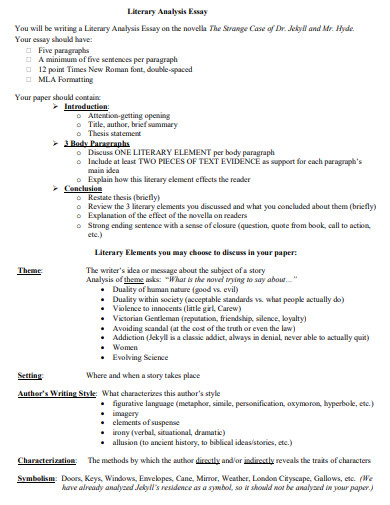
Size: 336 KB
10. Peer Editing Literary Analysis Essay Example
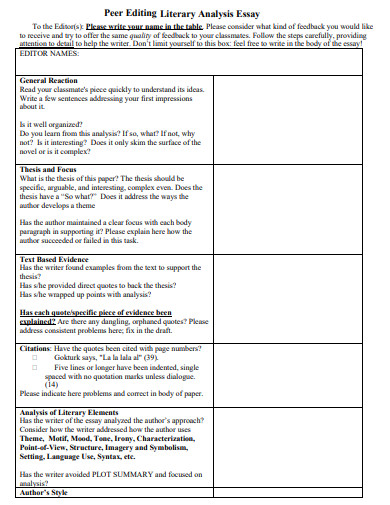
Size: 226 KB
11. Professional Literary Analysis Essay Example
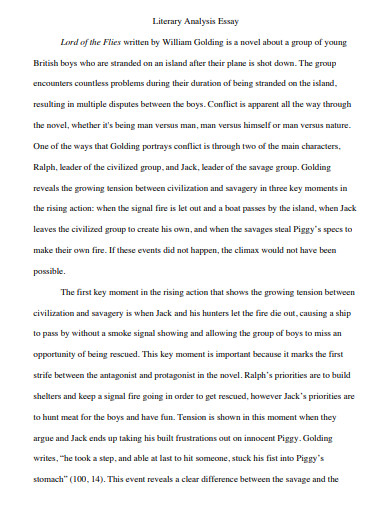
Size: 41 KB
12. Literary Analysis Assessment Outline Essay Example
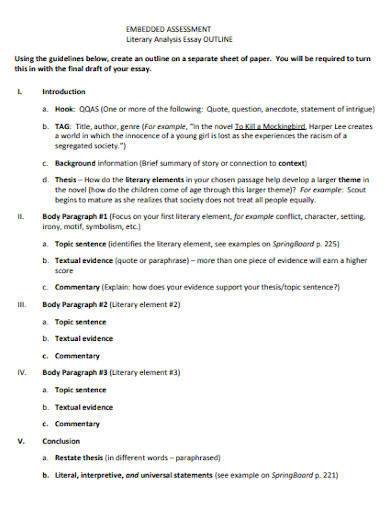
Size: 61 KB
13. High School Literary Analysis Essay Example
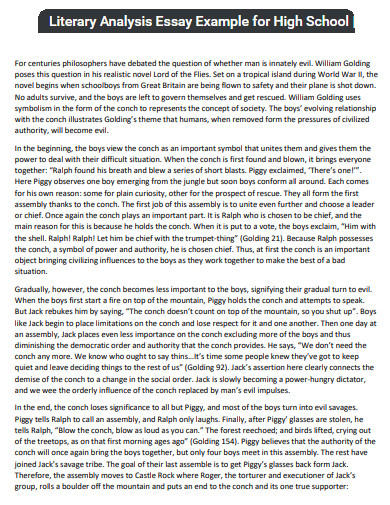
Size: 95 KB
14. Evaluation of a Literary Analysis Essay Example
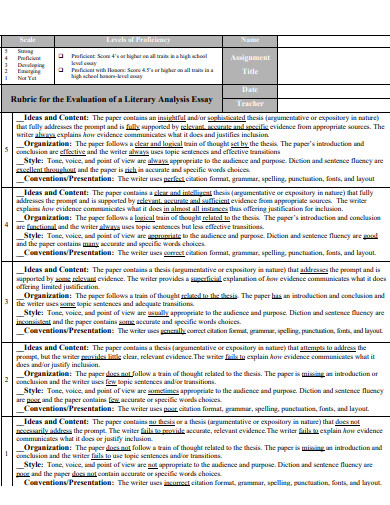
Size: 22 KB
15. Graphic Organizer Literary Analysis Essay Example
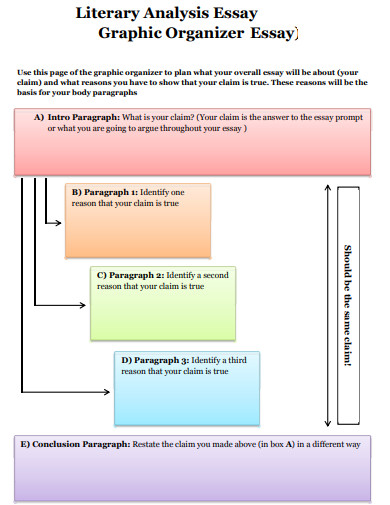
Size: 306 KB
16. Literary Analysis Essay Structure Example
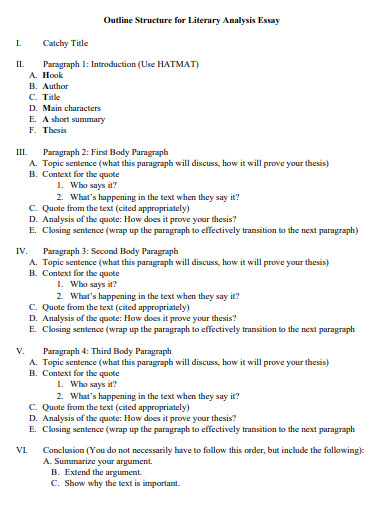
Size: 178 KB
17. Literary Analysis Essay Writing Example
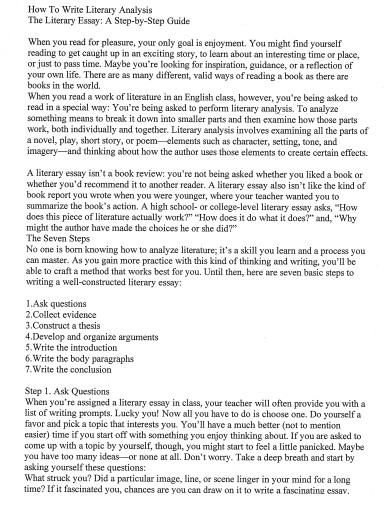
18. College Literary Analysis Essay Example
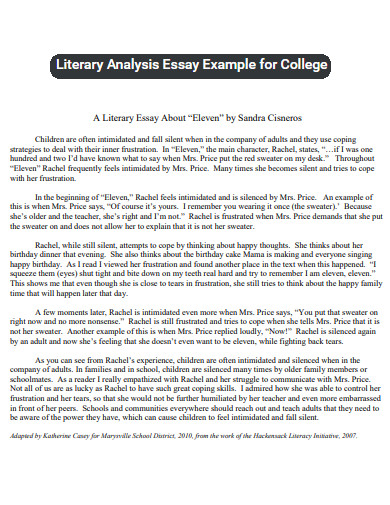
Size: 468 KB
19. Literary Analysis Essay Rubic Example
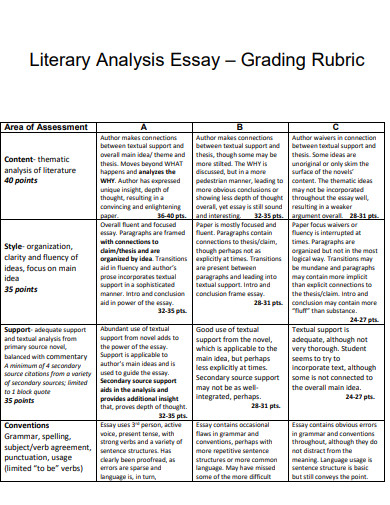
Size: 644 KB
20. Simple Literary Analysis Essay Example
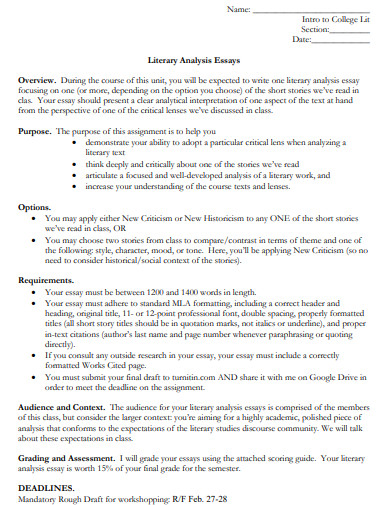
Size: 88 KB
21. Writing a Literary Analysis Essay Example
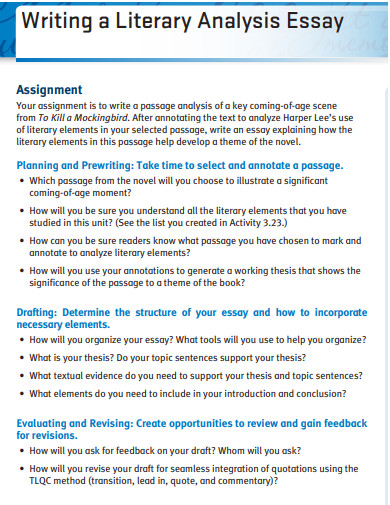
Size: 500 KB

22. Introduction to Literary Analysis Essay Example
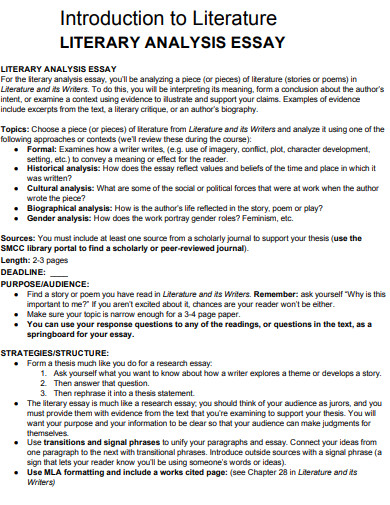
Size: 368 KB
23. Short Story Literary Analysis Essay Example
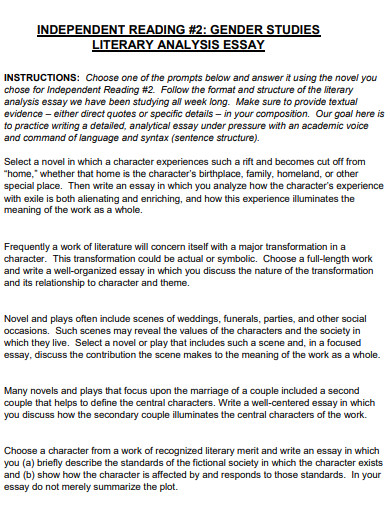
Size: 103 KB
24. 8th Grade Literary Analysis Essay Example
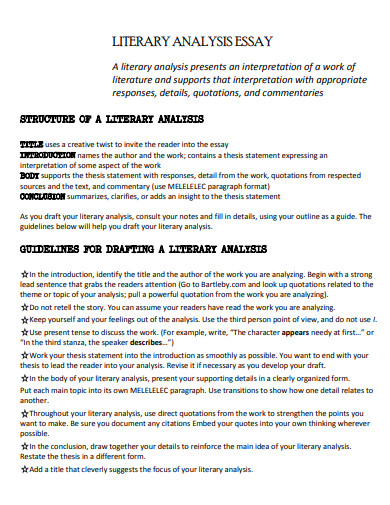
Size: 278 KB
25. Literary Analysis Essay Assignment Example
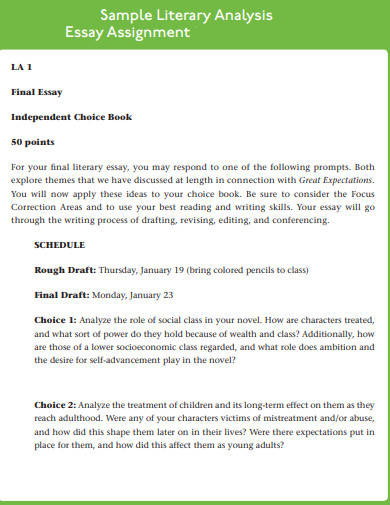
Size: 47 KB
26. Literary Analysis Video Essay Example
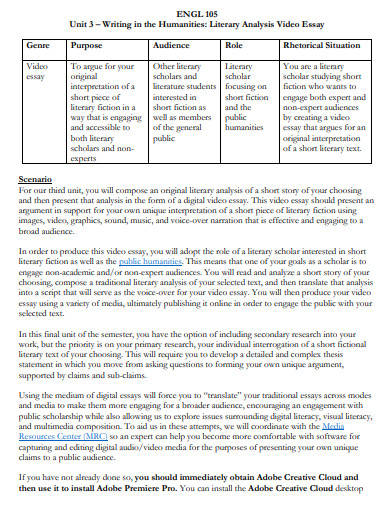
Size: 208 KB
27. Student Guide for Literary Analysis Essay Example
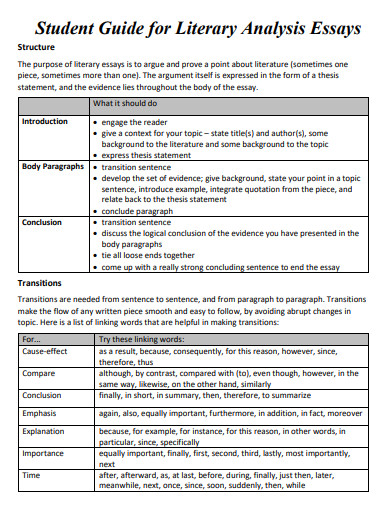
Size: 956 KB
28. MLA Literary Analysis Essay Example
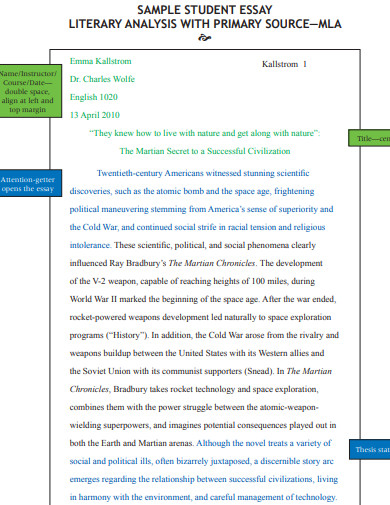
Size: 116 KB
29. Draft Literary Analysis Essay Example
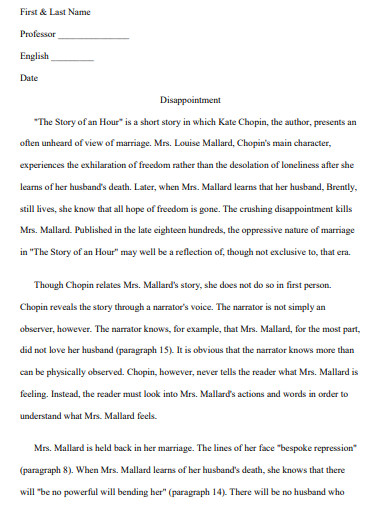
Size: 112 KB
30. 9th Grade Literary Analysis Essay Example
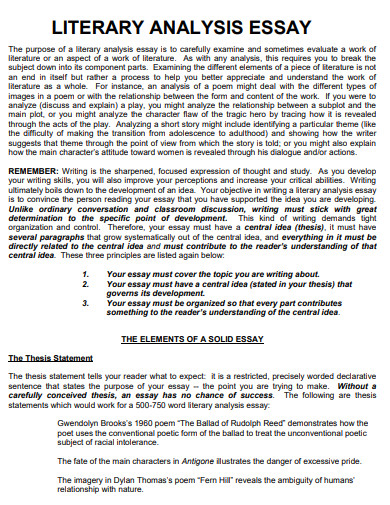
Size: 93 KB
31. Literary Analysis Essay Guide Example
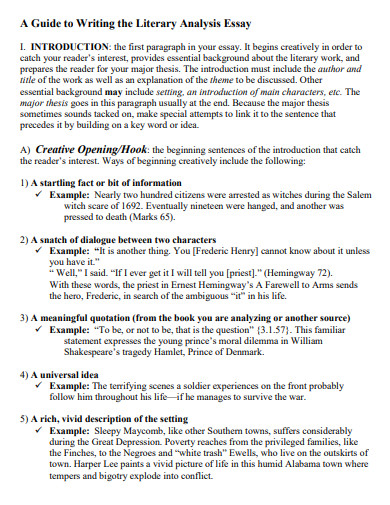
Size: 36 KB
What is a Literary Analysis Essay?
A literary analysis essay is a critical examination and interpretation of a literary work. It involves analyzing various elements such as plot, characters, themes, and literary devices to uncover deeper meanings and insights. By dissecting the text and exploring its nuances, readers can gain a deeper appreciation for the author’s intentions and the work’s impact. A well-written literary analysis essay provides a comprehensive analysis that goes beyond surface-level observations.
How to Write a Literary Analysis Essay
Before we dive into the examples, let’s outline the steps involved in writing a literary analysis essay:
Step 1: Choose a literary work:
Select a literary work that you want to analyze. It could be a novel, short story, poem, or play. Ensure that the chosen work is rich in literary elements and offers ample material for analysis.
Step 2: Familiarize yourself with the work:
Read the literary work carefully, taking note of important plot points, characters, themes, and literary devices. Pay attention to the author’s writing style and the overall tone of the work.
Step 3: Develop a thesis statement:
Craft a strong thesis statement that encapsulates your main argument or interpretation of the literary work. Your thesis should be clear, concise, and debatable, providing a roadmap for your analysis.
Step 4: Gather evidence:
Collect evidence from the literary work to support your thesis statement. Look for specific examples, quotes, and literary devices that reinforce your analysis. Take note of the context in which these elements appear.
Step 5: Organize your essay:
Create an analysis paper outline to structure your essay effectively. Divide your essay into introduction, body paragraphs, and conclusion . Each body paragraph should focus on a specific aspect of your analysis, supported by evidence.
Step 6: Write your essay:
Start with an engaging introduction that provides background information and introduces your thesis statement. In the body paragraphs, analyze different aspects of the literary work, providing evidence and explanations. Ensure a smooth flow between paragraphs. Conclude your essay by summarizing your main points and reinforcing your thesis .
What are some examples of literary devices?
Literary devices are techniques used by authors to enhance their writing and convey meaning. Examples include metaphors, similes, personification, alliteration, and symbolism. For a comprehensive list and explanations, refer to Literary Devices .
Are there any specific examples of short story analysis essays?
You can find examples of short story analysis essays in PDF format here . These examples provide insights into analyzing the elements of a short story effectively.
How does context impact literary analysis?
Context plays a crucial role in literary analysis as it helps readers understand the historical, social, and cultural background in which the literary work was written. It provides insights into the author’s intentions and influences the interpretation of the text.
Text prompt
- Instructive
- Professional
Analyze the theme of courage in a novel for your Literary Analysis Essay.
Write about the use of symbolism in a short story for your Literary Analysis Essay.
Want to create or adapt books like this? Learn more about how Pressbooks supports open publishing practices.
Dr. Sandi Van Lieu
**For a video overview of this essay, see further down on this page.

Video Overview:
Attributions
- Images and video created by Dr. Sandi Van Lieu and licensed under CC BY NC SA.
- Student essay example by Janelle Devin and used with permission.
The RoughWriter's Guide Copyright © 2020 by Dr. Karen Palmer and Dr. Sandi Van Lieu is licensed under a Creative Commons Attribution-NonCommercial-ShareAlike 4.0 International License , except where otherwise noted.
Share This Book

IMAGES
COMMENTS
What is the essay's thesis statement, and how do you know it is the thesis statement? What is the main idea or topic sentence of each body paragraph, and how does it relate back to the thesis statement? Where and how does each essay use evidence (quotes or paraphrase from the literature)?
These sample thesis statements are provided as guides, not as required forms or prescriptions. The thesis may focus on an analysis of one of the elements of fiction, drama, poetry or nonfiction as expressed in the work: character, plot, structure, idea, theme, symbol, style, imagery, tone, etc.
Explore a collection of 30+ literary analysis essay examples in Word, Google Docs, and PDF formats. Learn how to analyze literature effectively, understand literary devices, create a strong thesis, and provide a comprehensive conclusion.
SAMPLE THESIS STATEMENTS These sample thesis statements are provided as guides, not as required forms or prescriptions. #1 The thesis may focus on an analysis of one of the elements of fiction, drama, poetry or nonfiction as expressed in the work: character, plot, structure, idea, theme, symbol, style,
Example thesis statement for a literary analysis essay Mary Shelley uses shifting narrative perspectives to portray Frankenstein in an increasingly negative light as the novel goes on. While he initially appears to be a naive but sympathetic idealist, after the creature’s narrative Frankenstein begins to resemble—even in his own telling ...
Literary essays are argumentative or persuasive essays. Their purpose is primarily analysis, but analysis for the purposes of showing readers your interpretation of a literary text. So the thesis statement is a one to two sentence summary of your essay's main argument, or interpretation.
7) MAJOR THESIS: a statement that provides the subject and overall opinion of your essay. For a literary analysis your major thesis must (1) relate to the theme of the work and (2) suggest how this theme is revealed by the author. A good thesis may also suggest the organization of the paper. „ Ex.
Throughout this sample literary analysis, footnotes are used to highlight the key components of a literary analysis paper, including: • a strong thesis statement • an explanation of quotes • a utilization of credible, scholarly sources . Please do not include footnotes in a literary analysis paper unless they are specified by your ...
Importance of the Thesis; Topics and Personal Stances; Characteristics of a Thesis Statement; Additional Resources:
The thesis statement tells your reader what to expect: it is a restricted, precisely worded declarative sentence that states the purpose of your essay -- the point you are trying to make. Without a carefully conceived thesis, an essay has no chance of success. The following are thesis statements which would work for a 500-750 word literary ...